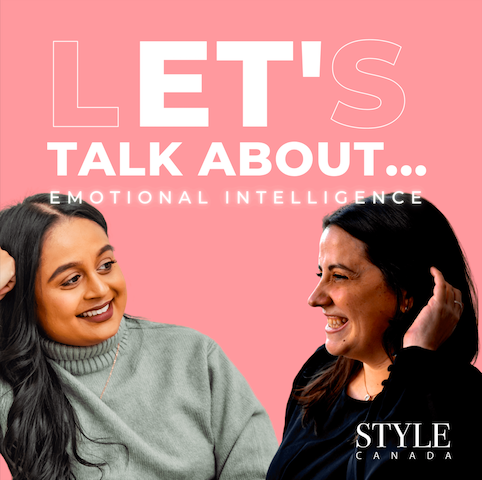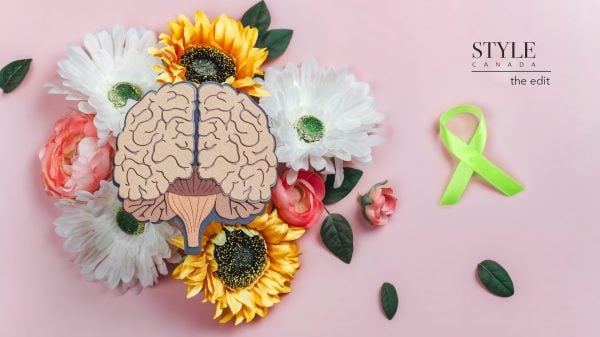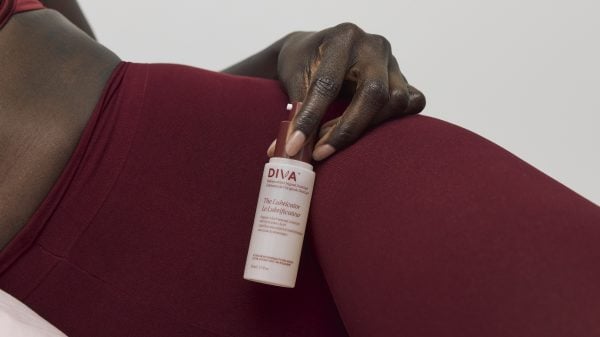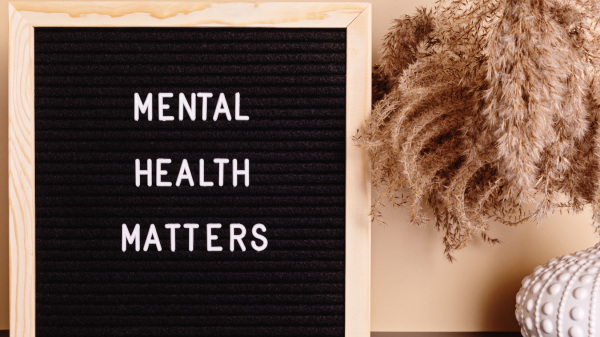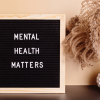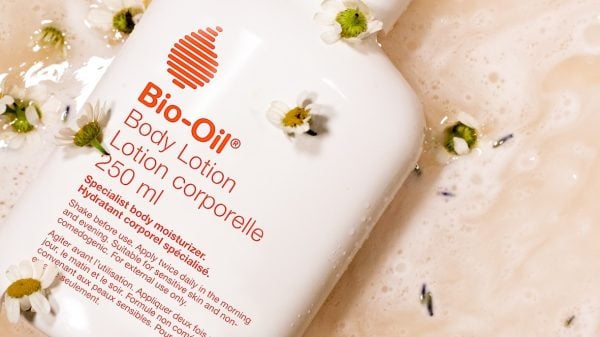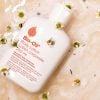On this week’s episode of Let’s Talk About…, Elise sits down with co-host Sarah Joseph to talk about happiness.
Sarah is a certified emotional intelligence coach whose mission is to help you get comfortable with your emotions and master them to live a more purposeful life. She understands how our lack of emotional management can impact the longevity of our relationships and can inspire our emotional healing by plugging into our most powerful tool, the Mind. Her philosophy is that our emotions show up in every aspect of our lives and it’s your right to learn how to manage them effectively to your advantage.
On this week’s episode, Elise and Sarah talk about what is happiness, creating your own happiness, and ways to practice gratitude in our daily lives.
“…Happiness kind of feels like it’s this place that’s away from us, it’s far away and we have to work towards it, and we have to go towards it, we gotta march towards this thing. And that’s because we don’t even realize that happiness isn’t a destination. It’s just a feeling. It’s a state of being.” Sarah tells Elise on Let’s Talk About.
Check out our show’s full transcript below.
[00:00:00] Elise: Hi everyone, and welcome. This week let’s talk all about happiness. We’re continuing our series on emotional intelligence with certified emotional intelligence coach Sarah Joseph.
Hi Sarah.
[00:00:11] Sarah: Hi, how are you?
[00:00:13] Elise: I’m good. How are you?
[00:00:14] Sarah: I’m doing great and excited for another topic. I know,
[00:00:18] Elise: I feel like this is the age old question of like, how do we be happy? I feel like especially in a world where it feels like everyone is like heightened emotion and like stress levels, maybe anxiety levels, all of those things.
Mm-hmm. , um, you know, to talk about. Take a second and talk about like, okay, what is happiness? What does it actually mean to be happy? Is it what we’re striving for? Are we, maybe some of us are striving for peace? Maybe some of us are just striving to get by. I don’t know, but mm-hmm. , um, I’ve always been interested in the topic.
I remember, reading the book, the Happiness Journal or the Happiness Project. .
[00:01:01] Sarah: Okay.
[00:01:01] Elise: I don’t know if you ever read it was, it came out a while. This was honestly probably like years ago now. Um, it’s by Gretchen Rubin and basically she spent, I’m trying to remind myself a little bit about it, but she’s basically like, spent a year, I think it was figuring out like what ha what happiness is. She brings in a lot of like scientific research. If there’s one thing I remember, it was, talked a lot about, a lot about gratitude and how that was correlated with happiness.
[00:01:32] Sarah: And we’re gonna talk a lot about that today too.
[00:01:34] Elise: Okay. Okay, cool. So maybe we start with like, yeah, what is.
[00:01:39] Sarah: Exactly. So what is happiness? So if we just, uh, before even getting onto this Yeah. Uh, podcast, I was like, what is happiness? Like, I really thought about this topic Yeah. Before I even decided to jump into it.
And I was like, let me Google a definition because I’m a girl that likes definitions, because it really gives me some structure to where we’re going. So here’s what Google says. Google says to be happy. , it’s just a feeling of pleasure or contentment and happiness is the state of being happy. So the state of being in pleasure or contentment.
Right. So from all of our teachings and everything we’ve learned through the podcast, we know that happiness or feelings are vibrations and physical sensations in your body, right? So, and it’s funny because a lot of us do this thing where we wait to be happy, right? So I’ll be happy when, when I get the job.
Exactly. I’ll be happy when I make X amount of money. I’ll be happy when I move out. I’ll be happy when I’m married and I have kids. You know, I’ll be happy when I get that promotion. And it’s funny because deep down that means we really think that happiness is a destination. And having all of us heard that happiness is not a destination, but I don’t think a lot of us really understand what that means.
So I kind of wanna break that down today. So happiness kind of feels like it’s this place that’s away from us, it’s far away and we have to work towards it, and we have to go towards it, we gotta march towards this thing. And that’s because we don’t even realize that happiness isn’t a destination. It’s just a feeling.
It’s a state of being. And. . What we learned from the other podcast is that our thoughts create our feelings, right? And if our thoughts can create our feelings and our emotions, and that means our thoughts can create happiness. Mm-hmm. , it means our thoughts can create. Feeling of pleasure and contentment.
So what are we waiting for? ?
[00:03:35] Elise: Yeah. Like we have it. The power in our own hands. Right? Literally we have access to it. I think it’s interesting too, like, cuz you said what you thought of when you thought of happiness and for me the first thing that I was like was, oh, I feel like it would be joy. Like happiness would be these really peaks in life that are just like, not so much the destination, but like, oh, I’m so happy that I, you know, Got that raise or I’m so happy that like my family’s healthy and we’re having this celebration for, you know, a birthday or like those, those real peaks in life.
But I think it’s interesting that they use the word content in there because really, and I think this is also just with age, you kind of realize that if you could just be content, That’s almost better for, and maybe this is an individual thing, but for me, I would almost prefer being content and stable than.
Highs and lows and highs and lows, right? Like that dramatic up and down. So I think that’s kind of, that just stuck out to me. I don’t know if you have any thought. It’s
[00:04:40] Sarah: interesting, like you said, it’s an individual approach because my approach is the opposite, right? Okay. So I actually wanna live like that.
I want to enjoy the ebbs and the flows, the ups and downs, right? And I think that’s because I learn a lot through pain, right? I learn a lot through negative emotion. That’s because I’ve done so much work to accept it, right? So I’ve done a lot of work. Accepting those negative feelings have brought me actually a lot of contentment in my life later down the line.
And there’s no way that we’re ever gonna be on this natural plane of contentment. Right. If anything that is actually boring. ?
[00:05:14] Elise: Yeah. Sorry. I guess, no. I guess when I, when I don’t, I mean more like, I definitely still need adventure in those sort of things, and I understand like the highs and lows of it, but I, I think it’s more like overall searching for a balance in those versus letting my emotion spike and drop.
Does that make sense?
[00:05:33] Sarah: Right. So being able to kinda control that. So
[00:05:35] Elise: a sense of like a little bit more sense of inner calm or. , you know, contentness, I guess. Um, that’s what that means for me. Like I still like know that life inevitably is gonna have like moments of great joy, moments of great despair.
Mm-hmm. , but how can I like, you know, react to those to or grow from those or whatever it might be to create an overall sense of a little bit more like calmness and stability. And I think that’s probably, cuz like my twenties were all over the. That like I do crave. Okay. Like, I have one house now. I’m not changing subletting each three months and traveling three times a week on a plane.
Like, that’s what I kind of mean by that. I guess I got it. So your
[00:06:23] Sarah: life experience was a little chaotic in that sense, so you, yeah, like I created
[00:06:27] Elise: my own chaos because I, like, it was in New York City, it was like all of the things and, and the job I was in and all like, it was just constant stimulation and chaos really in the best way, like,
I could do it in my twenties. I couldn’t do it in my thirties. Right. And that’s for someone else. Why do you think that is? Yeah. Like I had a best friend who, um, moved like in the middle of her thirties to a new city and like did, but for me, that all happened in my twenties. Mm-hmm. , so. Right. So I think there’s a little bit of difference there, but I love that we can, like, at the end of the day, , whatever way you want, whatever kind of, you know, if you want that extreme, if you want more stability, whatever it is, we can create that, right?
So we can create our own happiness. It’s through our own thoughts and emotions. So how, how can we go about like creating our own happiness right now, no matter what that looks like for you or
[00:07:22] Sarah: I. Right. Exactly. So, exactly. So if our thoughts create our feelings, right, then we can create happiness right now.
Like it can happen for us right now. We don’t need to wait. Right? We can stop waiting. So what’s interesting is that, Happiness are just chemical reactions happening in the body. That’s what we learned before, right? And it’s an expression, or the chemical production of dopamine, oxytocin, and serotonin and some endorphins.
And those specific, uh, hormones help with. , you know, making you feel loved, making you feel peaceful, making you feel happy, excited, content, right? And it makes you feel all those loving, happy, good feeling emotions. And what we wanna do is we wanna start to direct our mind at how we wanna think. So I think we talked about in another podcast that directing your mind and giving it focus of conscious thinking is gonna help us create more of the emotions that we wanna feel, such as happiness.
So how we can do that is by accessing our imagination and we can use that to access our past, present, and our future. . And what’s great is that the brain actually can’t tell the difference between an imagined experience and a real life experience. So it produces the same chemical reaction in your body because it thinks it’s experiencing it in real time.
So even if you are living in a past experience, a past memory, for example, a present or a future thought within, it’s a happy thought, which can also heavily aid in manifestation, for example. You are going to feel exactly what that would feel like if it was happening to you in real life. And that’s because your brain is in, its cased in its skull and it just can’t see outside of you.
So it uses whatever imagine imagined experience that it’s getting to create its reality. So it’s going, even though you are imagining that you are on a. Plane to Vegas right now, and you feel really happy about that, I’m gonna help you feel that that’s what you’re gonna feel and experience when you’re doing that.
So it’s interesting. Like I said, we can create happiness right now. So when we wanna access our past, for example, we could just sit and go into your mind and you can access a past memory, you know, maybe a birthday, maybe it was getting married, maybe it was you doing something with your partner, a friend or family member.
or maybe an accomplishment in your life that you were really happy about, and you can literally go in to visualize that and you will literally feel the chemical response of happiness coming up within your body. You’ll start to feel good. You’ll start to feel maybe some tingling on your body. You’ll start to feel the your heart palpitating just a little bit.
Maybe feel some fluttering in your stomach because it just feels good. . Um, then when you wanna access from your future, what you can do is go into your future and use manifestation as part of this. So maybe there is something you really wanna do with your life, there’s a goal that you wanna. Really get to what you can do is sit with yourself and go into your imagination and imagine yourself playing out that exact accomplishment or that exact thing that’s making you feel good.
And your body is gonna produce all the chemicals that it needs to make you feel happy about that accomplishment, even though it hasn’t happened yet. And the reason why our imagination is so important is because it allows us to access a part of manifestation that a lot of people are missing. So a lot of us go into manifest.
the life that we wanna live, for example, or we write it down and we, you know, never think about it again. But the whole process of that manifestation is to go into your imagination and look at every single step of getting there. And what’s gonna happen is your body is gonna, one, recognize that this is the routine that it wants to follow.
And then two, it’s gonna produce chemical reactions to help you feel really happy and good about it. So it’s gonna produce a lot of dopamine. And as we know, dopamine helps. Feel motivated. So you’re gonna wanna get there way faster than if you had just wrote it down on a piece of paper and never thought about it again.
Right? So going into your future, using your imagination is great, and then go accessing your present is basically noticing a lot of the pleasure and contentment that you have currently in your life. So just looking around you. Okay? I’ll ask you right now. Look around you and what are three things that make you happy in that room?
[00:11:28] Elise: Um, my dog. Who’s quietly sleeping behind me? This cup of tea. What else makes this, this room isn’t, oh, there’s a picture of me, my sister, I just noticed. So that’s kind of good.
[00:11:41] Sarah: Okay, good. And just by looking at you, you’re laughing. You’re smiling. Yeah.
[00:11:45] Elise: It’s also beach, though. If I turn my head slightly more, I see the snow, but if I just look at that beach picture, it’s a little better.
[00:11:52] Sarah: Exactly. Exactly. But you just created happiness, right? It’s true. Yeah. And you created that right from within your body, right? So you just access the past memory or even physical things that you really, that bring you a lot of pleasure and contentment to make you feel happy in those moments. Right? Um, so what’s great is that we can do a lot of gratitude journaling and abundance journaling to help us notice the things that actually do make us content and happy in our life.
And, the biggest part about gratitude journaling or the reason why a lot of people struggle with it is because they’re not aware of how to feel happy. Right? They’re not sure what actually brings them contentment and joy and peace and happiness, right? And if we continue to live in this place where we believe that, Happiness is a destination and it’s somewhere far away from us.
And we don’t build a skill to learn how to feel happy now. Well, when that destination comes, you’re not gonna feel happy about it. You’re gonna be on. Right. And that’s, you havent built that. Exactly. Interesting. You wanna start now with small things and then extend that into noticing the big things that come in the future.
[00:12:58] Elise: So can we go a little deeper into the idea of gratitude journaling or maybe just gratitude in general that I know we’ve all kind of heard of, but I do think there’s a lot to be said about this. I remember I did, probably like three years ago, it was, I think called the Magic. It was like the same authors, or maybe not the same authors, but the same series as The Secret.
Yes, but I believe it was called The Magic. And it’s all about gratitude. Like it, and it, each day it makes you do like a little, a little action towards gratitude. And it’s over the course of like 30 days. Um, and I’ve done it twice and I loved it, and I’m just, and I really did make me happier actually. And so, and, and you do see, like when you even are a little nicer to people how that comes back. And so it really kind of comes back to that idea of your thoughts and that mindset that we’ve talked so much about. Right? Yeah. But it’s physically seeing it in play. So can we dive a little bit more into gratitude, I guess, and and how we can bring that into our lives?
[00:14:06] Sarah: For sure. So something that I’ve been doing is I’ve been gratitude journaling for the last year now, and of course there are times where I’m on and off, but it’s been more consistent because I’ve like built the skill to be more consistent at it. And what’s great is that as you are writing down, so my specific journal has, you know, a date and a time and then it has, you know, three blurbs where you can write three things in your day that you were grateful for and you really learned how to build that skill to be mindful, to notice what happiness.
Came about in your life so that we’re not all clouded by the negativity and the anxiety and the stress that may have also happened in the day, right? Because that seems to kind of take our focus and attention. And then we spend a lot of time in those negative emotions. And as much as we need to to understand what they feel like, we also need to pull ourselves, know when it’s appropriate to pull ourselves away and notice also the gratitude that’s happening and notice the abundance and happiness.
So what’s happening is, as I’m writing each one, , what you’re doing is you have to access a part of your brain. You have to access a part of your thinking, right? To remember that memory or to go back and actually notice when what’s what you’re grateful for. And there are times I’m stuck, right? And I’m now, I’m kind of rewinding through my mind or looking around me in my space to notice what makes me feel happy, content and be grateful for, and joyful for. And what’s that doing that’s doing, that’s building the skill. One to notice gratitude, to notice what things bring you joy and love and contentment, but it’s also allowing you to experience it in your mind. And that means if you’re experiencing it in your mind, you’re experiencing it in your body because your body is now producing chemical reactions and producing dopamine oxytocin and serotonin and endorphins to help you feel good, right? So every time you write something down, have you ever felt bad? Never. No. Right?
[00:15:56] Elise: I’ve never felt bad.
[00:15:57] Sarah: That’s a great
[00:15:57] Elise: point. I’ve never felt bad. No. I’ve always felt like a sense of release or gratitude, or depending on what I’m writing about.
Yeah. .
[00:16:04] Sarah: Exactly. So we’re creating happiness. All right there in the span of a few seconds, accessing our memory, accessing what’s around us to be able to create happiness right now in this moment. Um, the other thing with grateful journaling is that if you continue to do it more consistently and build it as a skill in your brain and in your mind, and in your body, what’s gonna happen is over time you are going to increase your happiness by at least 10%.
So, Yeah, but, and that’s for the longevity of your life, and that will keep increasing as you keep getting better at it. It was funny because you can also do gratitude journaling or gratitude meditating, so you can go into your mind and just sit and meditate with yourself and notice all of the good things, abundant things happening in your life.
and, um, they have ha actually said that people that meditate, that are really devoted meditators and that can access those parts of their brain when they need to actually have an in, like they took samples of their blood to measure, to see what, you know, what the difference was between someone who didn’t meditate and someone who did and they found complete chemical changes in their blood and they…
[00:17:12] Elise: wow.
[00:17:13] Sarah: Right. And that was because they’re being able to produce chemicals in their body that make them feel happier for a longer period of time. Right. That’s so. I feel like
[00:17:23] Elise: there’s so much. We dunno. . .
[00:17:26] Sarah: So meditating and great grateful journaling is amazing cuz you’re building the skill. And so that means you’re literally changing your D n A.
You’re literally changing your chemical makeup in the biology of your body to exist in this reality that you want to live in. So you can create happiness the same way that you can create the reality that you wanna feel and see every day. .
[00:17:49] Elise: That’s amazing. You’ve just like converted me to I gratitude journal once in a while.
Not consistent with it. Um, I, I know that there was someone that I spoke with once that said in kind of just what you said, you can kind of say it out loud. So if you don’t have time that day, you can kind of say it on your walk to the bathroom, say it while you’re on the toilet if you need to, or just list like three or five.
Out loud or in your head. Sometimes it’s, I’ve heard it’s a little bit better if you do it out loud that you’re grateful for if you don’t have that time to journal. Um, but I would, ima, for me anyway, when I do have the time to journal, it does feel more impactful. Yeah. Um, but very interesting like that, that’s such a marked difference.
[00:18:34] Sarah: Another tip that my partner and I actually do is we have a huge mirror in our washroom and we take markers and we have a journal prompt in there and it’s like, what’s one thing you’re grateful for? And we’ll both list a few things for that day or one thing for that day. And I mean, we’re always in and outta the bathroom.
We might as well just write something on the mirror, right? Mm-hmm. . And it’s right there in front of you. There’s no way you can ignore it. And you’re getting that gratitude practice in there every single day. I actually had a client that really struggled with gratitude journaling, and she was on and off for a year as well, and she came to me and she was like, I know this works.
I get it, but I just can’t seem to stay consistent. I just don’t feel good enough. I don’t feel like I deserve any happiness and I don’t deserve to see it because. These are not abundant great things. These are just mediocre things, right? And I went, whoa, whoa, whoa. Like your ability to breathe is not a mediocre thing, or that is definitely something to be grateful for, but.
because she came from that mindset. The mindset that helped shift her was for her to notice that the universe was always providing her with things to be grateful for and abundance in her life. The universe was always giving, giving to her, and she was always receiving, and what helped her notice it even more?
I was like, Grateful journaling or gratitude journaling is just you collecting receipts of all of the times in your life where the universe or God has been abundant to you, and you are able to literally go back in time and look at them all. You’re able to go back and say on August 3rd, 2012, The universe gave me oxygen to breathe.
I love that. Right? Or on this day, at this time, I got this. And you’re just collecting a receipt book to notice that you do deserve. And when I put it that way, she went, whoa. It’s just receipts. Like I’m just collecting data information. I’m just. giving myself proof and I went, yep, that’s all it is. And that’s all you need to look at it.
And over time you’re gonna build a skill and cuz it makes you feel good, you’re gonna wanna keep doing it. Mm-hmm. ,
[00:20:32] Elise: you have like a new product. There might not be the gratitude journal anymore, it might be like the Receipt book, gratitude receipt book that marked .
No, I love that. I love that. Is there any other, just as you were kind of sharing, you know, when we think things that we could do to make us a little happier every day. I also bring back to the idea of like, you know, you mentioned the picture or I mentioned the picture and you kind of elaborated on that. I don’t have that many photos. I feel like just a core wise, I used to have photos of family and friends.
I don’t have that many anymore, and maybe that’s just a really nice way, a reminder of gra like a very easy, like low lift way to remind yourself of moments of gratitude. Literally a receipt book and photos, I
[00:21:19] Sarah: guess literally. So I also have photos up of just like people in my life that I care about and that I like to see, and they make me feel joyful all the time.
Right. Something I also do to kind of invoke that mindfulness and to feel a little better is before I had my cat, of course he now can’t. Have, I can’t have flowers, too many flowers around anymore. Um, but before that I would buy, you know, flowers for myself and I would take a minute after work or in between work to go and like actually adore them.
Like flowers are actually such a beautiful creation. Yeah. And like we were talking in our LA last podcast, it’s such a feminine quality, right? They hold so much feminine energy. And what I like is that, as I’m going there to smell it. The aroma just also built a lot of dopamine, oxytocin, serotonin in your body, right?
And then there’s also just looking at how beautiful it is, you know, talking to it, saying affirmations to it. Just allowing it to grow. And it’s funny because. I read a, I think it was Angelina Jolie’s daughter, I can’t remember, but she had did a science experiment where they took two types of plants and they spoke really highly about one plant.
And every morning she would go to it and talk to it and say really positive affirmations and beautiful things towards it. And then the other plant, she just watered and gave it. The basic needs, we, they found that the plant that had the positive affirmations, along with its basic needs, grew much more bigger and beautifully.
And stayed alive much longer than the plant that didn’t get any affirmation at all. So it’s, I have a plant
[00:22:51] Elise: that’s dying and I was literally gonna Google today, how can I keep this plant alive to it? I’m gonna just talk to it. I’ll report to it.
[00:22:59] Sarah: And the reason why talking works is because it’s vibrational energy, right?
So you’re sending off vibrations. Speaking that create energy to help it grow, right? So I know that it’s not something that we can see, but if you hold a micro microscope to everything, you would be able to sense vibration from everything. Um, That you’re saying towards this plant? So I talk to all of my plants, but I say them, I say things like, you’re growing so well keep growing.
You’re beautiful. You know, keep sprouting. And then like I’ll just nurture them and love them. And I noticed that they start healing magically like right away. That’s so
[00:23:32] Elise: cool. Okay. I’m definitely gonna try that actually, cuz I was literally just like thinking about that today. Um. I love all the little, and even when you mentioned the flowers, like I would also, not only just having the flowers, but I would like go to a flower market and pick the individual flowers that I liked.
Beautiful. And I would do that like once every couple weeks. And I loved, like, that was a, a favorite activity of mine.
So we all have to go out by a gratitude journal slash receipt book. Yes. Photos of favorite memories or places even like your happy place. Mm-hmm. in your home.
Talk to your plants. Go pick out flowers, meditate of the day. Yeah. I love that. Yeah, exactly. And I was thinking too, as you were saying, like the practice of gratitude with yourself. Like why not, of course you could do that, like in your own relationships, like I have. A girls weekend coming up and like, how nice of an activity would that be if we like all kind of went around and said what we were grateful for, maybe about each other or like just in general, like I feel like that’s like a great bonding exercise too.
[00:24:44] Sarah: will 100% increase the intimacy that you have with each other because you’re accessing your vulnerability, right? And at the same time as you’re doing that, notice how your body feels, right? Notice the smiles going around in the room. Notice how everyone is feeling internally. Notice the sensations buzzing around in you because that’s happiness.
Right, and we’re creating it right now. So happiness can be created right now. That’s kind of the big ticket with this podcast today is happiness can be created right now. You don’t have to wait to be happy. It’s not a destination. It’s happening for you right now and something else that can really help.
With, increasing your happiness levels is to do things that bring you more pleasure and contentment. Whether that’s, you know, your craft hanging out with your friends, like you said, hanging out with your partner, going to the gym, going for a walk. Anything that makes you just feel happy, do more of it.
Right? Don’t limit yourself. Keep doing more of it, and allow yourself to enjoy. So that when the difficult moments do come, you’re able to have a tolerance to be able to withstand them because you know how to access your happiness as well. So you’ll be able to think more positively during those times.
And gratitude journaling is great for that.
[00:25:51] Elise: Well, I feel more happy now that we’ve had this conversation. All honesty. I feel like me too, much more grateful, ready to take on the rest of the day. Thank you so much, Sarah. Where can everyone find you? ,
[00:26:02] Sarah: They can find me on social media, on Instagram, on TikTok and Twitter.
And then I also have an article on my five-step process and so many more articles to come in that area. You can check it out at shemadedigital.com.
[00:26:14] Elise: Awesome. Thank you.
[00:26:16] Sarah: Thank you.


